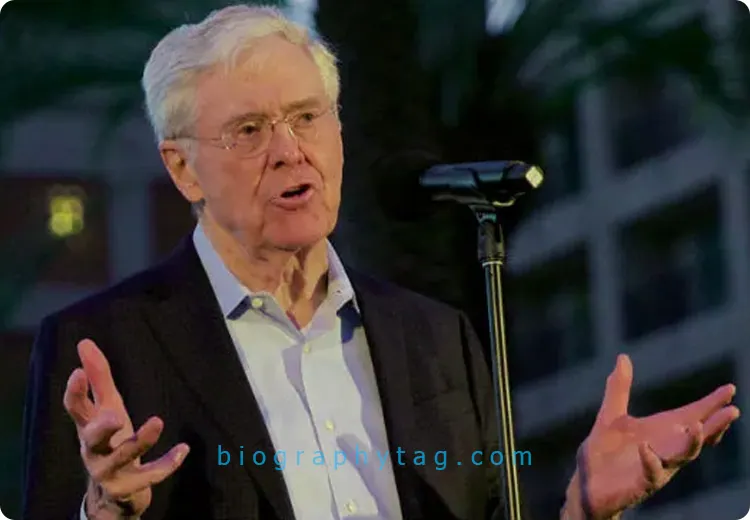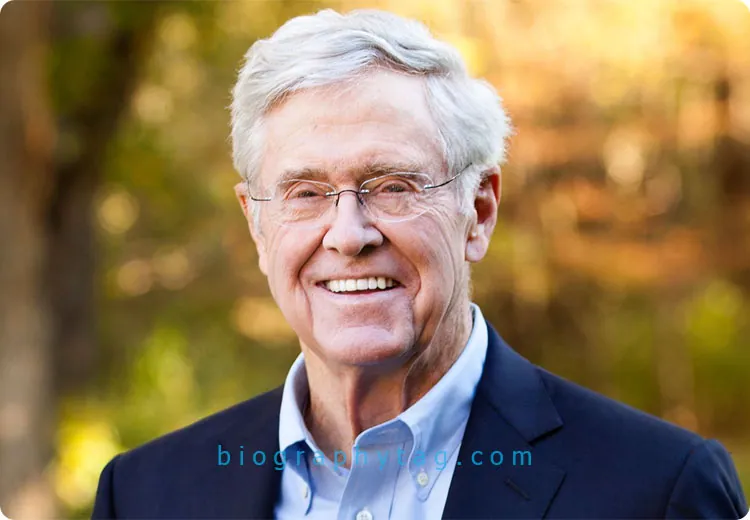Charles Koch Biography: If you are looking for Charles Koch Biography then this is for you. Because here Charles Koch Biography Career, Age, Height, and all information. We have collected this information for you from various sources. Which will help a lot to know more about Charles Koch. So without further delay let’s begin.
Charles Koch Biography
Charles Koch is an influential American businessman, philanthropist, and political donor, known for his leadership of Koch Industries, one of the largest privately-owned companies in the world. Born on November 1, 1935, in Wichita, Kansas, Charles G. Koch is the son of Fred C. Koch, who founded the company in 1940.
Koch attended the Massachusetts Institute of Technology (MIT), where he earned both a Bachelor of Science and a Master of Science degree in engineering. After completing his education, he joined Koch Industries in 1961 and became president of the company in 1967, succeeding his father. Under his leadership, Koch Industries diversified its operations, expanding into various industries including oil refining, chemicals, pulp and paper, and commodities trading.
Charles Koch is known for his libertarian political views and his significant financial support for libertarian and conservative causes. He has been a prominent advocate for limited government, free-market economics, and individual liberty. Through organizations like the Cato Institute and the Americans for Prosperity Foundation, Koch has worked to promote his ideological beliefs and influence public policy.
In addition to his business and political activities, Charles Koch is also a noted philanthropist. He has donated substantial sums of money to educational institutions, think tanks, and other charitable organizations. The Charles Koch Foundation and the Charles Koch Institute are among the philanthropic entities he has established to support causes aligned with his principles.
Koch has authored several books, including “The Science of Success: How Market-Based Management Built the World’s Largest Private Company” and “Good Profit: How Creating Value for Others Built One of the World’s Most Successful Companies.” These books reflect his business philosophy, which emphasizes the importance of market-driven decision-making and creating value for customers.
While Charles Koch’s influence in business and politics has made him a controversial figure, particularly among critics who disagree with his libertarian ideology and the perceived influence of money in politics, there is no denying his significant impact on both the business world and American politics.

Charles Koch Summary
| Full Name: | Charles de Ganahl Koch |
| Nickname: | Charles Koch |
| Father: | Fred C. Koch |
| Mother: | Mary R. Koch |
| Birth date: | November 1, 1935 |
| Age: | 88 Years |
| Zodiac Sign: | Scorpio |
| Height: | 5′ 6” |
| College/University: | MIT ADT University School of Engineering |
| Profession: | Businessman |
| Birth Place: | Wichita, Kansas, United States |
| Net Worth: | 55.4 billion USD |
Business Ventures
Charles Koch is primarily known for his involvement in Koch Industries, one of the largest and most diversified privately-owned companies in the world. Koch Industries was founded by his father, Fred C. Koch, in 1940 as an engineering firm. Under Charles Koch’s leadership, the company expanded and diversified into various industries, including:
Oil Refining and Chemicals: Koch Industries became a major player in oil refining and chemicals production. It owns refineries and chemical plants across the United States, producing a wide range of products including gasoline, diesel, petrochemicals, and polymers.
Forest and Consumer Products: Koch Industries has interests in forest and consumer products, including paper and pulp production. Through subsidiaries like Georgia-Pacific, the company manufactures a variety of paper products, building materials, and consumer goods.
Commodities Trading: Koch Industries is involved in commodities trading, including trading in oil, natural gas, metals, and agricultural products. Its trading arm, Koch Supply & Trading, operates globally and engages in the buying, selling, and transportation of commodities.
Industrial Services: Koch Industries provides a range of industrial services, including equipment and services for pollution control, process technology, and equipment manufacturing.
Ranching: Koch Industries owns extensive ranching operations, primarily in the United States, involved in cattle breeding and beef production.
Personal Life and Legacy
Charles Koch’s personal life and legacy extend beyond his business ventures. Here are some aspects of his personal life and contributions to society:
Philanthropy: Charles Koch is a significant philanthropist, having donated millions of dollars to various charitable causes and organizations. His philanthropic efforts focus on education, free-market economics, criminal justice reform, and libertarian principles. He has supported educational institutions such as George Mason University and the Massachusetts Institute of Technology (MIT), as well as organizations like the Cato Institute and the Bill of Rights Institute.
Political Activism: Koch is known for his involvement in politics, particularly as a major donor to libertarian and conservative causes. Through organizations like Americans for Prosperity, he has advocated for limited government, free-market policies, and reducing regulations. His political activism has sparked controversy and debate over the influence of money in politics.
Authorship: Charles Koch is the author of several books on business management, economics, and political philosophy. His writings, including “The Science of Success” and “Good Profit,” articulate his views on market-based management and the importance of creating value for society.
Family Legacy: Charles Koch comes from a family with a significant business legacy. Koch Industries, founded by his father Fred C. Koch, has grown under Charles’ leadership into one of the largest privately-owned companies globally. His brothers, David Koch (deceased) and William Koch, have also been involved in the family business and philanthropic endeavors.
Impact on Business: Charles Koch’s management philosophy, known as Market-Based Management (MBM), has had a profound impact on Koch Industries and has been influential in the business world. MBM emphasizes principles such as customer focus, continuous improvement, and empowerment of employees.
Environmental and Social Responsibility: Koch has faced criticism for Koch Industries’ environmental record and perceived influence on climate change policy. However, in recent years, the company has made efforts to improve its environmental performance and has invested in sustainable initiatives.
Legacy Planning: As a prominent figure in business and politics, Charles Koch’s legacy is likely to continue through his philanthropic activities, business ventures, and advocacy for libertarian principles. He has expressed a desire to leave a positive impact on society through his work and philanthropy.
Harles Koch Childhood
Charles Koch was born on November 1, 1935, in Wichita, Kansas, USA. He was one of four sons born to Fred C. Koch and Mary Robinson Koch. His father, Fred C. Koch, was an influential figure in his life. Fred Koch was an entrepreneur and the founder of what would later become Koch Industries, a conglomerate that Charles would eventually lead.
Charles Koch grew up in Wichita, where his father’s company was based. His childhood was shaped by the influence of his father, who instilled in him a strong work ethic and entrepreneurial spirit. Fred Koch was deeply involved in his sons’ upbringing, teaching them the values of self-reliance, innovation, and integrity.
As a child, Charles Koch showed an early interest in science and engineering, which would later influence his educational and professional pursuits. He attended local schools in Wichita before going on to study at the Massachusetts Institute of Technology (MIT), where he earned both a Bachelor of Science and a Master of Science degree in engineering.
While details about Charles Koch’s childhood are not extensively documented, it is clear that his upbringing in a family deeply involved in business and entrepreneurship played a significant role in shaping his values, beliefs, and eventual career path. The lessons he learned from his father would guide him as he took on leadership roles within Koch Industries and became a prominent figure in business, politics, and philanthropy.
Harles Koch Education Qualification
Charles Koch pursued his higher education at the Massachusetts Institute of Technology (MIT). He earned both a Bachelor of Science (B.S.) and a Master of Science (M.S.) degree in mechanical engineering from MIT. This educational background equipped him with a strong foundation in engineering, which he would later apply in his career, particularly in the realm of business and industry.
Awards and Recognition
Charles Koch has received various awards and recognition throughout his career, primarily for his business leadership, philanthropy, and contributions to society. Some of the notable awards and recognition include:
Horatio Alger Award: In 2001, Charles Koch received the Horatio Alger Award, which is given to individuals who have overcome adversity to achieve success and who are committed to philanthropy and higher education.
William E. Simon Prize for Philanthropic Leadership: Koch was awarded the William E. Simon Prize for Philanthropic Leadership in 2006. This prize recognizes individuals who have made significant contributions to advancing the principles of free enterprise, personal liberty, and self-sufficiency.
Bradley Prize: In 2011, Charles Koch was awarded the Bradley Prize by the Lynde and Harry Bradley Foundation. The prize honors individuals who have made outstanding contributions to American institutions, particularly in the fields of public policy and private enterprise.
Entrepreneurial Legacy Award: Koch received the Entrepreneurial Legacy Award from the Association of Private Enterprise Education in 2013. This award recognizes individuals who have demonstrated exceptional entrepreneurial leadership and innovation.
Bastiat Prize for Journalism: In 2014, Koch received the Bastiat Prize for Journalism for his essay “Corporate Cronyism Harms America,” which was published in The Wall Street Journal. The Bastiat Prize is awarded annually to writers who promote free markets, individual liberty, and economic freedom through their journalism.
Read More:
